Be aware › Cougars

Welcome to Cougar Country
Some things you should know about Cougars
Please take care to prevent cougars from becoming nuisance animals by not feeding wildlife on your property and keeping your pets indoors.

The cougar, Puma concolor, is also known as the mountain lion, puma, catamount, screamer or panther.
Cougar habitat
Cougars can be found throughout Utah, usually in the foothill and canyon areas, but also sometimes down in the valleys — especially during the winter months when they follow deer searching for food to lower elevations. Cougars prefer pinyon-juniper and pine-oak brush areas. Within these habitat types, they prefer areas where there are rocky cliffs, ledges and tall trees or brush that can be used for cover.
Cougar feed
The main prey of cougars is deer, so they will be found wherever deer are. They will also eat elk, antelope, small mammals and birds.
After making a kill, a cougar will often take the carcass to the base of a tree and cover it with soil, leaves or snow, saving it to feed on later. Cougars are most active at dawn and dusk, which is when they hunt.
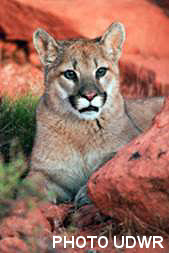
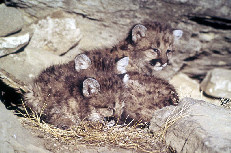
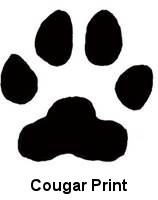

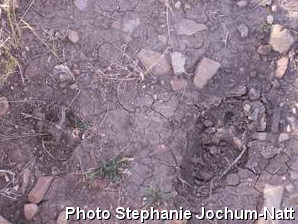
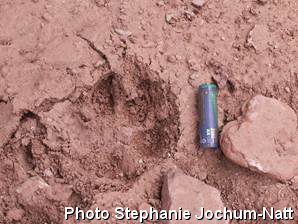
Cougars’ vocalization
How to prevent incidents with cougars
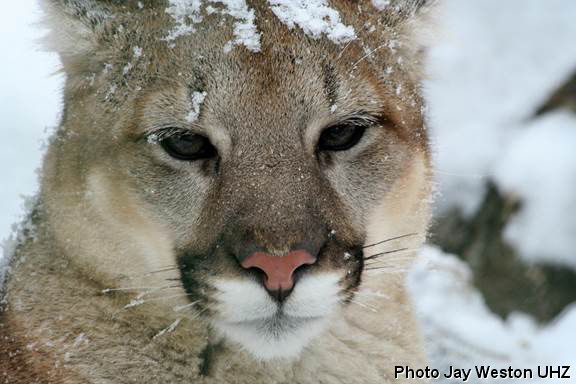
Remove wildlife attractants from your property, including pet food, water sources, bird feeders and fallen fruit. If your property and landscaping are attractive to deer and other wildlife, cougars may follow the wildlife into your property while searching for prey.
- Do not leave children outside unattended, especially at dawn and dusk.
- As a deterrent, install outside and motion sensitive lighting around your property.
- Trim vegetation and remove wood piles to reduce hiding places for wildlife.
- Bring pets and livestock inside at night or secure them in a barn or kennel with a top.
- Provide secure shelter for hobby farm animals such as poultry, rabbits and goats.
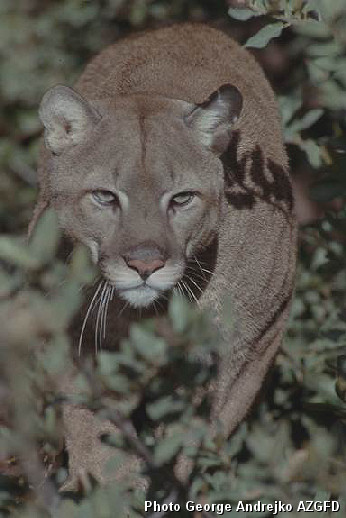
Preventing conflicts while recreating
- Do not hike or jog alone.
- Travel in groups and keep everyone together, including children and dogs.
- Make noise while hiking to alert cougars of your presence.
- Leave the area if you find a dead animal, especially deer or elk, because it could be a cougar kill. The cougar may return to the cache site and defend its food.
- Keep a clean camp. Store food and garbage in an odor-free, locked container or hung between two trees where cougars (and bears) cannot get it.
If You Encounter a Cougar
- Stop. Never run from a cougar. Do not approach the cougar.
- Maintain eye contact.
- Pick up children and pets or keep them very close.
- Stand up tall.
- Do not crouch or squat.
- Make yourself look bigger by raising and waving your arms or jacket above your head.
- Talk firmly in a loud voice, back away slowly and leave the area.
- Fight back if you are attacked! Protect your head and neck.
- If you are aggressive enough the cougar will probably flee.
If you have an encounter with aggressive wildlife, please report it to the nearest Utah Division of Wildlife Resources office. If the encounter or sighting occurs after hours or on the weekend, please call your local police department or county sheriff’s office, who can contact a conservation officer to handle the situation.

